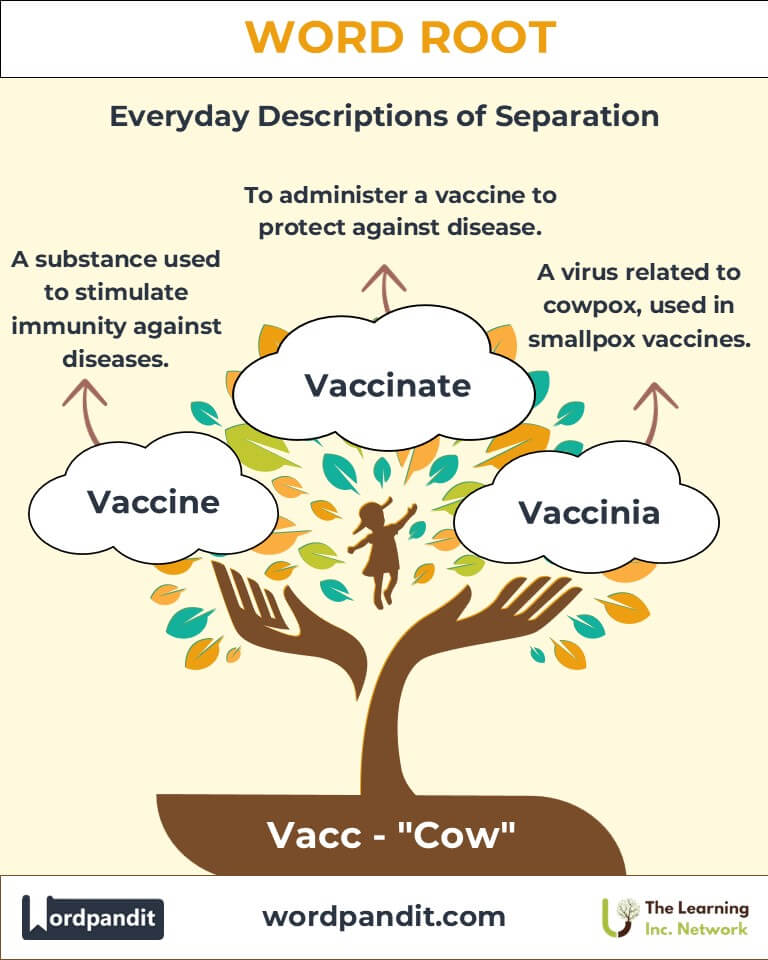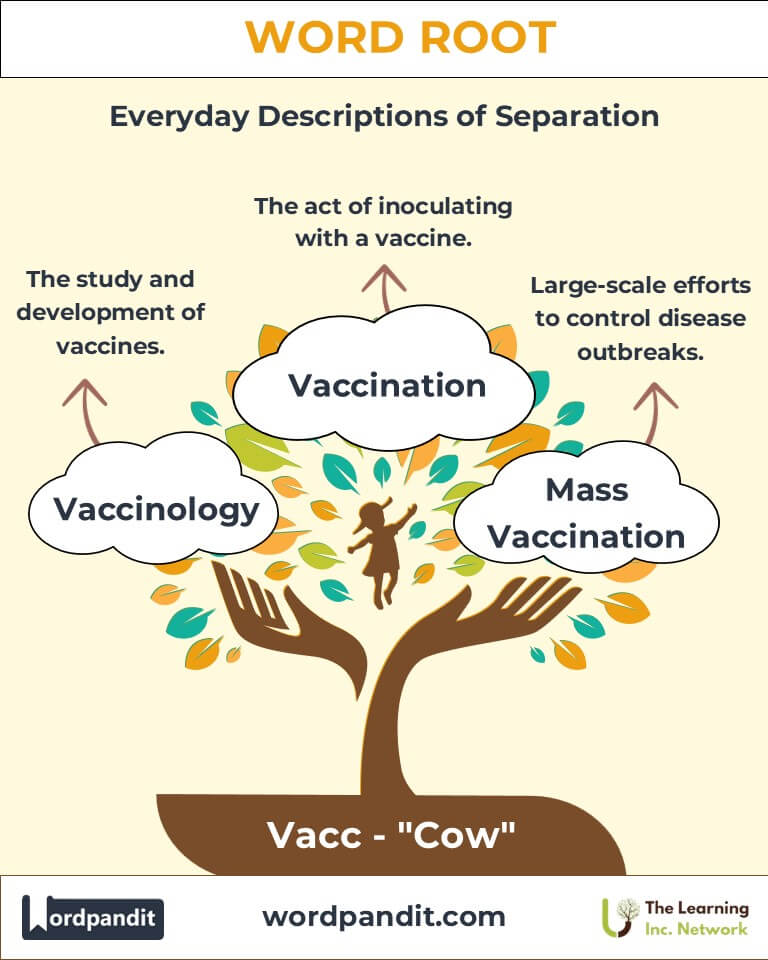Vacc: From Cows to Cures in Medicine and Language
Discover: The fascinating journey of the root "vacc," derived from the Latin word for "cow." This humble root revolutionized medicine with terms like "vaccine" and "vaccinia," shaping modern healthcare and preventive practices.

Table of Contents
- Introduction: The Significance of "Vacc"
- Etymology and Historical Journey
- Mnemonic: Unlocking the Power of "Vacc"
- Common Vacc-Related Terms
- Vacc Through Time
- Vacc in Specialized Fields
- Illustrative Story: "Vacc" in Action
- Cultural Significance of "Vacc"
- The Vacc Family Tree
- FAQs about the Vacc Word Root
- Test Your Knowledge: Vacc Word Root Quiz
- The Legacy of "Vacc" in Language and Medicine
1. Introduction: The Significance of "Vacc"
What connects cows to some of humanity's greatest medical achievements? The root "vacc," meaning "cow," ties them together. Derived from the Latin word vacca, "vacc" has etched its place in history and science, particularly through its association with vaccines—an innovation that has saved millions of lives.
Pronunciation: "vak"
Relevance: The "vacc" root underpins key medical breakthroughs and remains a cornerstone of healthcare today.

2. Etymology and Historical Journey
The root "vacc" originates from the Latin vacca (cow). It gained prominence in the late 18th century when Edward Jenner developed the first smallpox vaccine. Jenner’s groundbreaking method used cowpox (vaccinia) to immunize against smallpox, coining the term "vaccine" (from vaccinia). Over time, "vacc" evolved beyond its bovine origins, symbolizing immunity and disease prevention.
3. Mnemonic: Unlocking the Power of "Vacc"
Imagine a cow with a superhero cape labeled "VACC," symbolizing its role in conquering diseases through vaccination.
Mnemonic Device: "Vacc: The cow that became humanity's shield against disease."
4. Common Vacc-Related Terms
- Vaccine (vak-seen):
Definition: A substance used to stimulate immunity against diseases.
Example: "Vaccines have eradicated diseases like smallpox." - Vaccinia (vak-sin-ee-uh):
Definition: A virus related to cowpox, used in smallpox vaccines.
Example: "The vaccinia virus forms the basis of the first successful vaccine." - Vaccinate (vak-suh-nate):
Definition: To administer a vaccine to protect against disease.
Example: "The health campaign aims to vaccinate millions of children." - Vaccination (vak-suh-nay-shun):
Definition: The act of inoculating with a vaccine.
Example: "Mandatory vaccination policies curb outbreaks."
5. Vacc Through Time
- Early Usage: The term "vaccinia" first described cowpox, which Jenner used to combat smallpox.
- Modern Context: Today, "vaccine" refers to substances preventing diseases far beyond smallpox, from measles to COVID-19.
- Shift in Meaning: While initially linked to cows, "vacc" now symbolizes immunity and public health worldwide.
6. Vacc in Specialized Fields
- Medicine:
- Word: Vaccinology
- Application: The study and development of vaccines, advancing global health.
- Veterinary Science:
- Word: Vaccinate (in animals)
- Application: Used to prevent zoonotic diseases like rabies.
- Immunology:
- Word: Post-vaccination immunity
- Application: Describes the immune response generated by vaccines.
- Public Health:
- Word: Mass vaccination campaigns
- Application: Large-scale efforts to control disease outbreaks.
7. Illustrative Story: "Vacc" in Action
In a bustling clinic, Dr. Patel prepared to vaccinate a group of children against measles. She explained how Edward Jenner’s discovery of using cowpox laid the foundation for modern vaccines. One young patient, curious about the connection to cows, beamed when she learned the term "vaccination" came from vacca. This simple lesson inspired the child to dream of becoming a doctor, proving how the legacy of "vacc" continues to inspire new generations.
8. Cultural Significance of "Vacc"
The root "vacc" transcends its linguistic origin to symbolize progress and hope. From Jenner’s time to modern-day vaccine rollouts, "vacc" reflects humanity’s enduring fight against diseases. Cultural expressions, like statues commemorating Jenner and World Immunization Week, underscore its profound impact.

9. The Vacc Family Tree
- Immun- (Latin: protection):
Example: Immunization, immunity.
Connection: Describes the result of successful vaccination. - Patho- (Greek: disease):
Example: Pathogen, pathology.
Connection: The entities vaccines aim to combat. - Prophyl- (Greek: prevention):
Example: Prophylaxis, prophylactic.
Connection: Prevention methods, including vaccines.

10. FAQs About " Vacc "
Q: What does the root "Vacc" mean?
A: The root "Vacc" is derived from the Latin word vacca, meaning "cow." It is often associated with terms related to cows, cattle, and in modern contexts, vaccines.
Q: How is "Vacc" connected to vaccines?
A: The term "vaccine" originated from Edward Jenner's work with cowpox (Latin: vacca) to develop immunity against smallpox. The name reflects this historical connection to cows.
Q: What is the historical significance of "Vacc"?
A: "Vacc" has historical significance due to its role in the development of the first vaccine by Edward Jenner. He observed that milkmaids exposed to cowpox were immune to smallpox.
Q: Can "Vacc" have metaphorical meanings?
A: Yes, metaphorically, "Vacc" can represent protection or immunity, stemming from its association with vaccines and disease prevention.
11. Test Your Knowledge: " Vacc " Mastery Quiz
1. What does the root "Vacc" signify?
2. How did Edward Jenner use "Vacc" in his work?
3. What is the metaphorical meaning of "Vacc"?
4. What is the origin of the term "vaccine"?
5. What was the first vaccine developed for?
12. The Legacy of "Vacc" in Language and Medicine
From its humble bovine origins to its modern association with life-saving science, the root "vacc" embodies the power of innovation and prevention. As vaccines evolve to tackle emerging diseases, the legacy of "vacc" reminds us of the profound connections between history, language, and health. Let "vacc" inspire a deeper appreciation for the words—and innovations—that safeguard our future.












